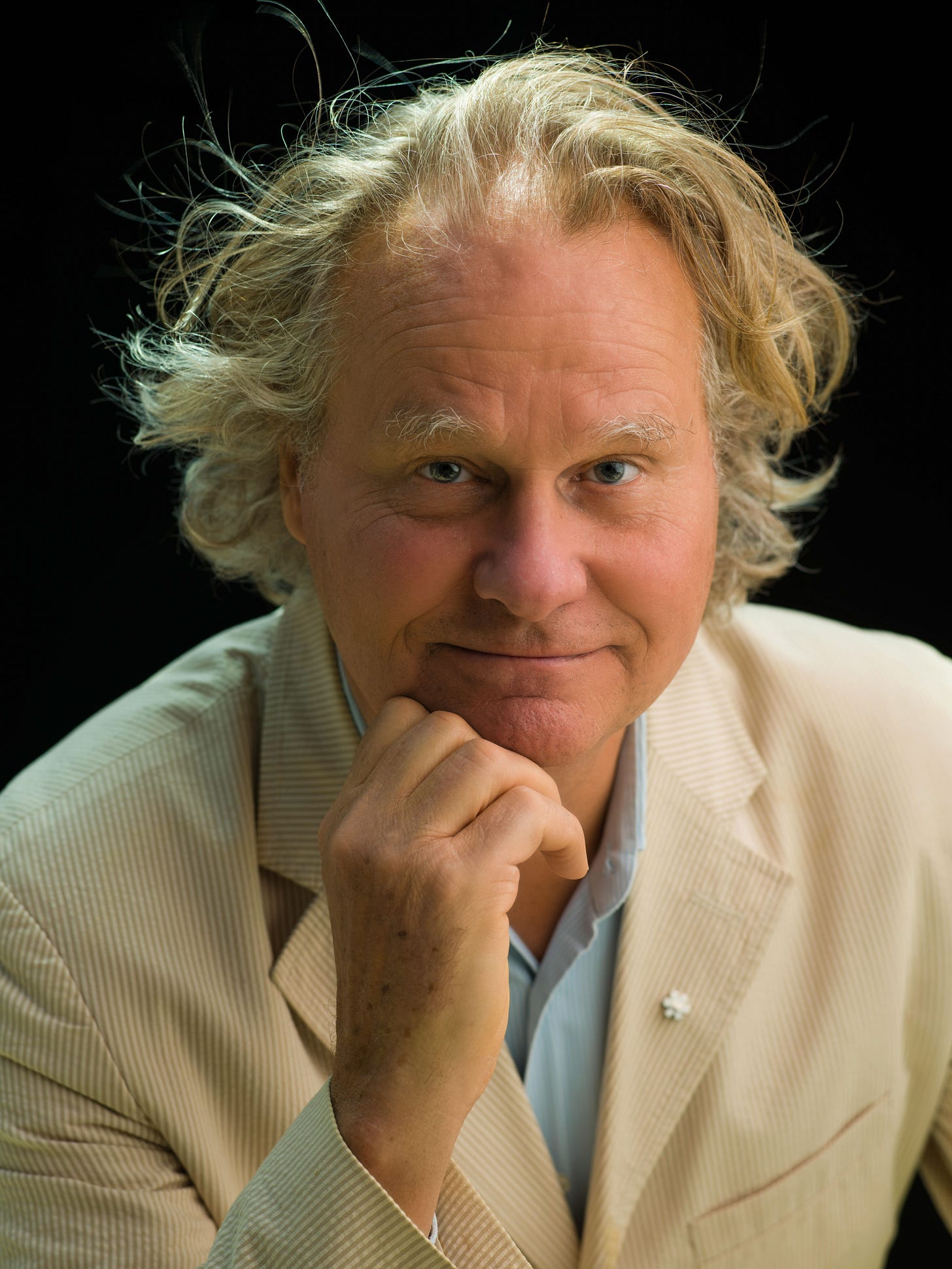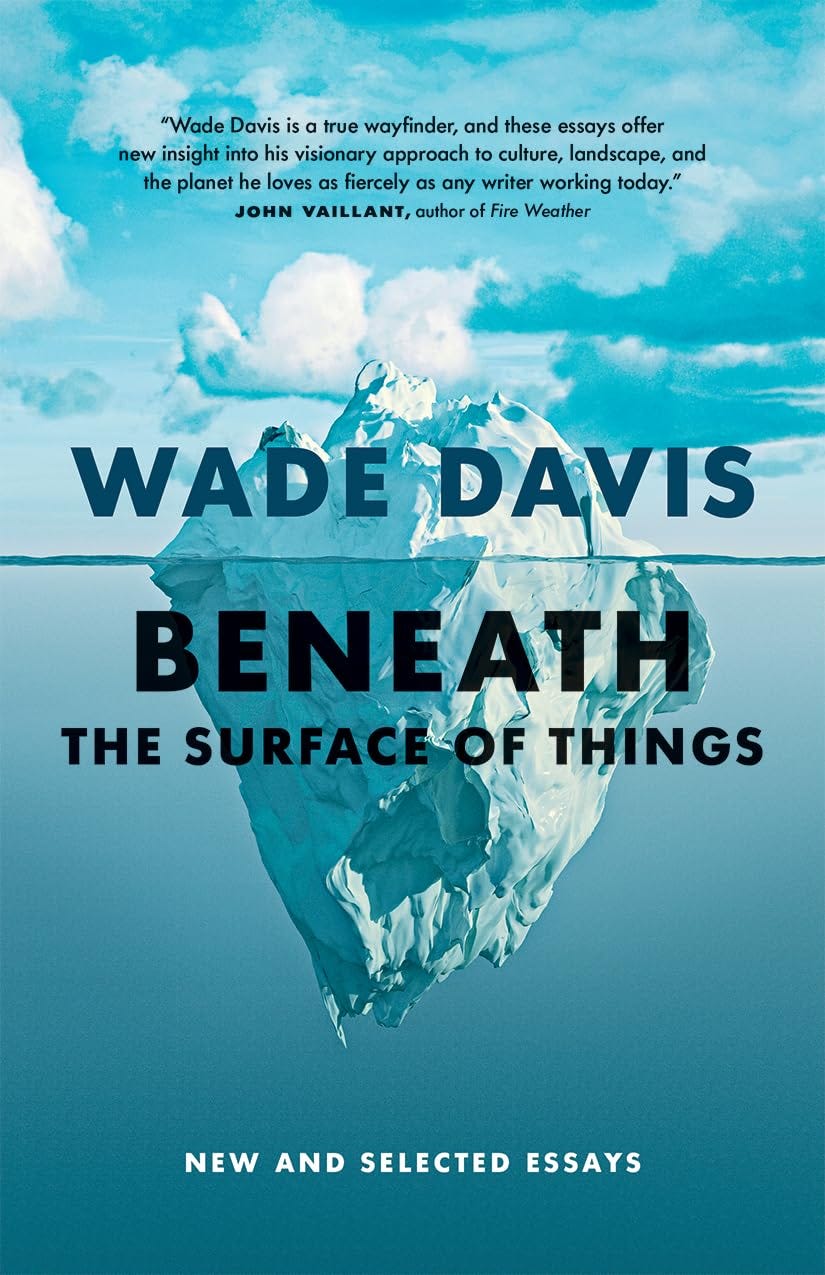Anthropology is the study of what makes us human.
With memorable elan, Wade Davis applies anthropology as a platform for exploring and illuminating a range of phenomena. A polymath possessing a restless intellect and unflagging energy, Davis explores the further reaches of the planet as well as familiar, often underexamined matters closer to home.
As he gets beneath the surface of things, he reveals interconnections and conjures unexpected associations.
In this episode of the Serve to Lead podcast, Wade Davis discusses his celebrated new book, Beneath the Surface of Things: New and Selected Essays.
In conversation as in writing, he’s eloquent and insightful on topics ranging from the knock-on effects of the global pandemic to the potential for an actionable political project to address global climate disruption.
Publisher’s Summary
“Wade Davis is a true wayfinder, and these essays offer new insight into his visionary approach to culture, landscape, and the planet he loves as fiercely as any writer working today.”—John Vaillant, author of Fire Weather
A timely and eclectic collection from one of the foremost thinkers of our time, “a powerful, penetrating and immensely knowledgeable writer” (The Guardian).
The essays in this collection came about during the unhurried months when one who had traveled incessantly was obliged to stay still, even as events flared on all sides in a world that never stops moving. Wade Davis brings his unique cultural perspective to such varied topics as the demonization of coca, the sacred plant of the Inca; the Great War and the birth of modernity; the British conquest of Everest; the endless conflict in the Middle East; reaching beyond climate fear and trepidation; on the meaning of the sacred.
His essay, “The Unraveling of America,” first published in Rolling Stone, attracted five million readers and generated 362 million social media impressions. Media interest in the story was sustained over many weeks, with interview requests coming in from 23 countries.
His essay, “The Unraveling of America,” first published in Rolling Stone, attracted five million readers and generated 362 million social media impressions. Media interest in the story was sustained over many weeks, with interview requests coming in from 23 countries.
The anthropological lens, as Davis demonstrates, reveals what lies beneath the surface of things, allowing us to see, and to seek, the wisdom of the middle way, a perspective of promise and hope that all of the essays in this collection aspire to convey.
“Wade Davis has a gift for saying the unsayable. He’s a fearless explorer in the intellectual world, as in the physical. His refusal to embrace conventional wisdom on climate change, for example, and instead think through the issue for himself, is a model of independent thinking. Even when I disagree with Wade, as with some of his bleak comments about the United States, I’m grateful for his voice. We usually live on the surface of ideas when we talk about issues such as war and racism; Wade takes us far deeper.”—David Ignatius, columnist and associate editor, Washington Post
Critical Acclaim
“A writer of breathtaking precision, Davis is as intrepid and original a thinker as he is astute. In these moving works born of stillness and reflection, he delves into some of the world’s most catastrophic paradoxes.” —Donna Seaman, Booklist STARRED Review
"An acclaimed essayist takes a deep dive into cultural issues at home and around the word... Davis knits history, sociology, faith, and scientific inquiry into a colorful, meditative tapestry." —Kirkus
“Terrific, eloquent, beautifully written and synthesized history. Your eye lands on the terrors with cold fury.” —Jann Wenner, founder of Rolling Stone
“Wade Davis' deeply-felt essays swim wide oceans of diverse culture and thought. He never fails to scoop up what he calls ‘the astounding sweep of the human spirit,’ as he shifts between history, ethnography, and personal missive. His essays show us how understanding other ways of being can open the gates of justice. He hands us the keys to insight within each of the seven thousand languages of the world. With wisdom and sure-footed research, he challenges us to let go of preconception and simply be." —Gretel Ehrlich
“Written by an eloquent explorer, and celebrating spiritual as well as material crafts and cultures, this book shows how attention to both has always been necessary for our survival. With enchanting precision, it reveals the wonders of our world, from complex communities to changing climates, while offering a refreshing balance between compassion and concern and between the arts and the sciences. This is an essential service for us right now, and Wade Davis is our frontline worker. Our wayfinder. If you want to be inspired to know more, and to do more, read this book.” —J. Edward Chamberlin, author of If This Is Your Land, Where Are Your Stories? and Storylines: How Words Shape Our World
“Wade Davis has the ability to look beneath the surface of what he observes, offering insights and interpretations that are invariably inspiring and bold. The breadth of his knowledge and the range of his curiosity are wondrous.”
—Andrew Weil
"Wade Davis is a master of the essay form, bringing a life of exploration, travel, reflection, and experience together in a bracing synthesis... The essay on climate change is simply the best thing I’ve read on the subject." —Michael Ignatieff
About Wade Davis
Wade Davis is Emeritus Professor of Anthropology and the BC Leadership Chair in Cultures and Ecosystems at Risk at the University of British Columbia. Between 2000 and 2013 he served as Explorer-in-Residence at the National Geographic Society. Named by the NGS as one of the Explorers for the Millennium, he has been described as “a rare combination of scientist, scholar, poet and passionate defender of all of life’s diversity.”
An ethnographer, writer, photographer and filmmaker, Davis holds degrees in anthropology and biology and received his Ph.D. in ethnobotany, all from Harvard University. Mostly through the Harvard Botanical Museum, he spent over three years in the Amazon and Andes as a plant explorer, living among 15 indigenous groups while making some 6000 botanical collections. His work later took him to Haiti to investigate folk preparations implicated in the creation of zombies, an assignment that led to his writing The Serpent and the Rainbow (1986), an international best seller later released by Universal as a motion picture. In recent years his work has taken him to East Africa, Borneo, Nepal, Peru, Polynesia, Tibet, Mali, Benin, Togo, New Guinea, Australia, Colombia, Vanuatu, Mongolia and the high Arctic of Nunavut and Greenland.
Davis is the author of 385 scientific and popular articles and 24 books, published in 23 languages, including the international bestsellers The Serpent and the Rainbow (1985), One River (1996), The Wayfinders (2009), and Into the Silence (2011), which won the Samuel Johnson Prize, the top award for nonfiction in the English language. Recent books include Magdalena: River of Dreams (2020) and Beneath the Surface of Things: New and Selected Essays (2024).
Davis’s photographs have been widely exhibited and have appeared in 38 books and 130 magazines, including National Geographic, Time, Geo, People, Men’s Journal, and Outside. He was curator of The Lost Amazon: The Photographic Journey of Richard Evans Schultes, first exhibited at the National Museum of Natural History, Smithsonian Institution. In 2012 he served as guest curator of No Strangers: Ancient Wisdom in the Modern World, at the Annenberg Space for Photography in Los Angeles. He was curator of Everest: Ascent to Glory, Bowers Museum, February 12-August 28, 2022. National Geographic has published two collections of his photographs, Light at the Edge of the World (2001) and Wade Davis: Photographs (2018).
His 40 film credits include Light at the Edge of the World, an 8-hour documentary series written and produced for the National Geographic. His most recent film, El Sendero de la Anaconda, a 90-minute feature documentary shot in the Northwest Amazon, is available on Netflix.
A professional speaker for 35 years, Davis has lectured at over 200 universities and 250 corporations and professional associations. In 2009 he delivered the CBC Massey Lectures. He has spoken from the TED main stage five times, and his three posted talks have been viewed by 8 million.
Davis, one of 20 Honorary Members of the Explorers Club, is Honorary Vice-President of the Royal Canadian Geographical Society, and recipient of 12 honorary degrees, as well as the 2009 Gold Medal from the Royal Canadian Geographical Society, the 2011 Explorers Medal, the 2012 David Fairchild Medal for botanical exploration, the 2015 Centennial Medal of Harvard University, the 2017 Roy Chapman Andrews Society’s Distinguished Explorer Award, the 2017 Sir Christopher Ondaatje Medal for Exploration, and the 2018 Mungo Park Medal from the Royal Scottish Geographical Society. In 2016, he was made a Member of the Order of Canada. In 2018 he became an Honorary Citizen of Colombia.
Image Credits | Wade Davis by Gene Driskell, via daviswade.com













